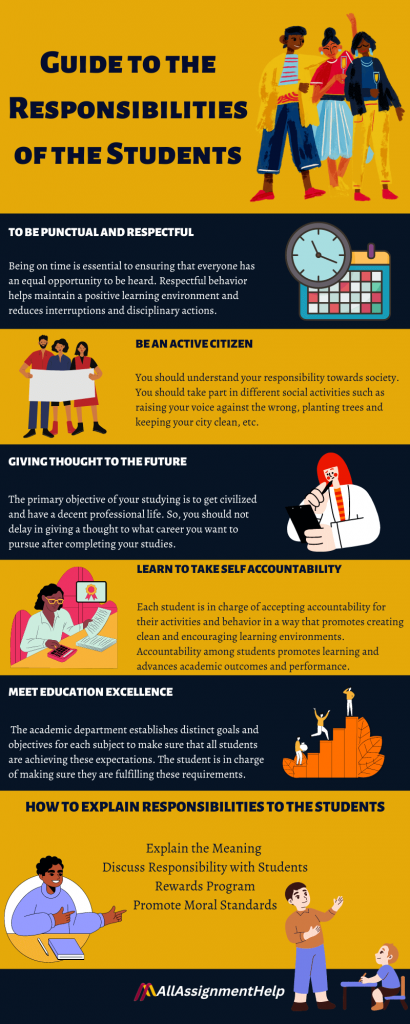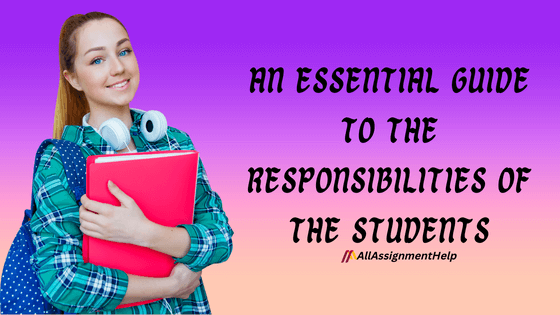Table of Contents
Although teachers are responsible for maintaining order in the classroom, students can also have a significant influence. As members of the classroom community, students have a direct impact on the environment and structure of the program.
A culture of learning, responsibility, and inclusivity may be established by educators and students working together. Effective teacher guidance and well-defined student roles and responsibilities generate a productive learning environment.
During the academic years, students learn the values of discipline, dedication, punctuality, teamwork, unity, and more as they aspire to become successful and ethical citizens. It’s a time that shapes them and provides them with the self-assurance and fortitude needed to face life’s challenges in the future. But to succeed and live successful lives, there are some things that students need to know.
Student responsibility emerges when they actively participate in their education and accept personal responsibility for their academic performance. They operate in a manner that moves them closer to their educational objective when they choose to do so. There are certain duties and responsibilities of the students that will accomplish both their personal and academic lives. Let’s learn more about these through the All Assignment Help blog.
What Are The Responsibilities of the Students?
Just as humans have rights and responsibilities toward their country, culture, and society, the same applies to students who are enrolled in school and have some responsibilities that must be fulfilled.Students have a crucial role in taking responsibility for their involvement, just as the teacher does in promoting the joy of learning. Even if this strategy seems appealing, it is important to start by creating an environment that values student accountability.
Let’s explore students’ academic roles and responsibilities:

Read Here: Classroom Management: A Necessity To Improve Students Behavior
To Be Punctual and Respectful
Students should be punctual in class and treat their classmates with respect. Being on time is essential to ensuring that everyone has an equal opportunity to be heard. Late or disruptive students can significantly impact the classroom environment and the student’s personal learning. Moreover, Respectful behaviour helps maintain a positive learning environment and reduces interruptions and disciplinary actions. Therefore, it is crucial for students to practice time management skills and preserve classroom discipline.
Students occasionally struggle to manage their workload due to many homework assignments. They may be unable to fulfil their student duties in such a circumstance. This is where companies that assist with assignments come into play. If any student is running out of time and needs to submit assignments on time, then in such a situation he or she can pay someone to do assignments on time as well.
Be an Active Citizen
The younger generation has been playing a key role in the change that society has seen in the past. Youths have fresh minds and they are zealous enough as well. As a result, they can do some tasks that other generations can’t do. Therefore, you should understand your responsibility towards society. You should take part in different social activities such as raising your voice against the wrong, planting trees and keeping your city clean, etc.
Giving Thought to the Future is Crucial
The primary objective of your studying is to get civilized and have a decent professional life. So, you should not delay in giving a thought to what career you want to pursue after completing your studies. In this process, make sure not to hurry and think about various aspects such as your interest, the scope in a particular field, and many others. This way you will be able to do a favor to yourself and could lead a fantastic professional life.
Also, while studying if you face any issues and problems with your assignment writing, you can take assignment writing services from experts as well.
Learn To Take Self Accountability
Each student is in charge of accepting accountability for their activities and behavior in a way that promotes creating clean and encouraging learning environments. Accountability among students promotes learning and advances academic outcomes and performance. However, These chances can be made by teachers. When students first enter the classroom atmosphere, roles and responsibilities might be assigned to them. This will allow them to take their self-accountability as a part of classroom management.
Meet Education Excellence
In order to succeed in their studies, students must reach specified academic standards. The academic department establishes distinct goals and objectives for each subject to make sure that all students are achieving these expectations. The student is in charge of making sure they are fulfilling these requirements and proving that they comprehend the subject matter. A student should speak with a professional who offers students assignment writing help if they feel they are not meeting up to the expectations.
Obey Your Teachers
In class, students are required to collaborate and follow all teacher instructions. This entails adhering to all classroom regulations, taking one’s designated seat, and paying close attention to the teacher. Additionally, it’s crucial for students to focus on their work and refrain from causing disruptions in the classroom. It is up to the teacher to choose what consequences if any, should be imposed on a student who disobeys one of the guidelines.
Support classroom culture
Class rules should be agreed upon by each student. There’s a greater chance of peer accountability when students contribute to the rules in the classroom. It might entail more peer-to-peer course correction and less teacher-to-student guidance for educators.
Ask questions
Make it clear to students that you expect and encourage them to ask questions that will spark their curiosity. Instructors can confirm this and let student feedback impact hands-on learning activities across the course of the lesson.
Participate actively
Students should make an effort to participate in class by attending properly. Extensive involvement optimizes the educational experience and establishes the classroom culture. Asking and responding to questions, finishing in-class assignments, and continuously coordinating conduct with the rules of the classroom are all examples of this engagement.
Accept responsibility for yourself
Students who are actively involved recognize that they belong to a learning community. Every student must accept accountability for their acts in a way that prioritizes creating secure and encouraging learning environments. Student responsibility promotes learning and aids in raising accomplishment levels in the classroom.
These are possibilities that teachers can generate. As soon as students enter the classroom, tasks and obligations can be assigned to them. Teachers who are receptive to students’ ideas regarding roles and duties they would like to assume will benefit their students. By involving students as strategic participants in their education, teachers may validate their roles in the classroom while also fostering self-assurance and character development.
How to Explain Responsibilities to the Students
No one is allocated responsibilities when they are born. To develop responsibility in students, parents, even teachers, need to take action. Accountability, responsibilities, and repercussions are lessons that students need to start learning early on. Teachers have a crucial role in imparting these crucial life skills to children, which can contribute to a better future for all people.
However, there are a few essential approaches that can be used to teach responsibilities to the students to have a good effect on their social and academic lives.
Explain the Meaning
Prior to learning how to be responsible, your students must first recognize what responsibility is. Conduct a conversation about what responsibility means in order to impart to your students this crucial skill. Discuss the concept of responsibility as well as what it could sound and seem like in the actual world.
Be a Problem Solver
When it comes to problem-solving skills, children require direction. Talk to students about many potential fixes for everyday issues. If they are without a pencil, they can access the classroom’s new pencil jar. Is your homework missing? To start afresh, request a fresh copy. When it comes to using the swing during recess? They could request that the person on it allow them to swing.
Students frequently merely want some broad concepts on problem-solving techniques. Having students come up with common problems, put them on notecards, and then discuss the answers as a class is an easy way to engage the class. Alternatively, you might make cards with examples of answers to frequent problems on them, which students could then match to the problem.
Discuss Responsibility with Students
Talking to students about responsibility is essential if you want to develop responsibility in them. When teaching children responsibility, be explicit about your aims and the results you hope to achieve. Explain why it is essential to establish the organization and provide each student with a defined task.
Rewards Program
Rewarding hard work is necessary. You should praise your students when they demonstrate responsibility in an active way. When a student demonstrates responsibility, compliment them on a successfully completed task. If you catch them being responsible, give them a hold punch on their card.
Relate their decisions to the repercussions
Students learn that our actions can have both positive and negative repercussions when we give them the freedom to make their own decisions. Create a lesson that uses examples of numerous scenarios in which students would have to make decisions as many students needed assistance understanding the relationship between their decisions and the results.
Promote Moral Standards
Responsibilities have the possibility of being difficult to complete with the consequences of doing so incompletely. All of this is a natural part of life, so students shouldn’t become afraid to participate in an activity for fear of doing it incorrectly. Keep an open line of communication with the students so they can seek assistance or tell you straight up if they can’t complete the work.
Also Read: Know Your Style of Learning
Conclusion
Students are a country’s future. They should strive to improve as people and citizens in order to show as much respect for their nation as they possibly can. Furthermore, teaching responsibilities is an essential life skill. It gets students ready for the real world by teaching them how to take responsibility for their own actions. There are various ways to teach responsibility, and the best way to figure out which ones are effective for your students is to experiment.
So, it was an effort from us to give an idea of the responsibilities of the students. Hope you find it useful. Furthermore, you can contact us for any academic assignment writing assistance. We have a group of experts who can help you in completing all of your subject assignments within your specified deadline. Also, students who are taking online classes can ask us to take my online class for me to pass their online course with the highest scores.
FAQs
| Q: What are the rights of students in schools and classrooms? A: Speech rights, immigrant rights, and disability rights are a few of the rights that students have in schools and in the classroom. |
| Q: How do the responsibilities of the students take place? A: When students take an active role in their education and accept responsibility for their academic performance, they are exhibiting student responsibility. They operate in a manner that moves them closer to their educational objective when they choose to do so. |
| Q: What role does the student have in the learning system? A: The student actively engages in both learning and teaching activities. The learner’s duties include: Actively listening to others, thinking, commenting, debating, and asking questions; reading, writing, talking, observing, and listening for understanding. |
